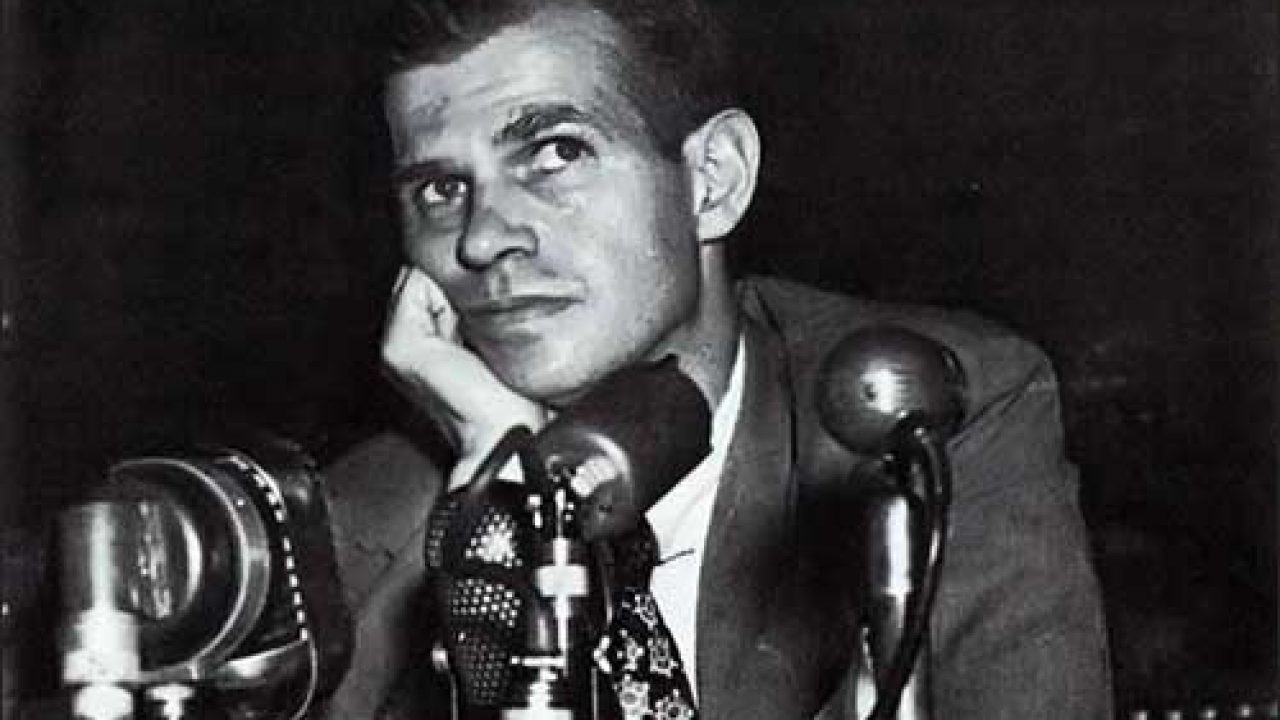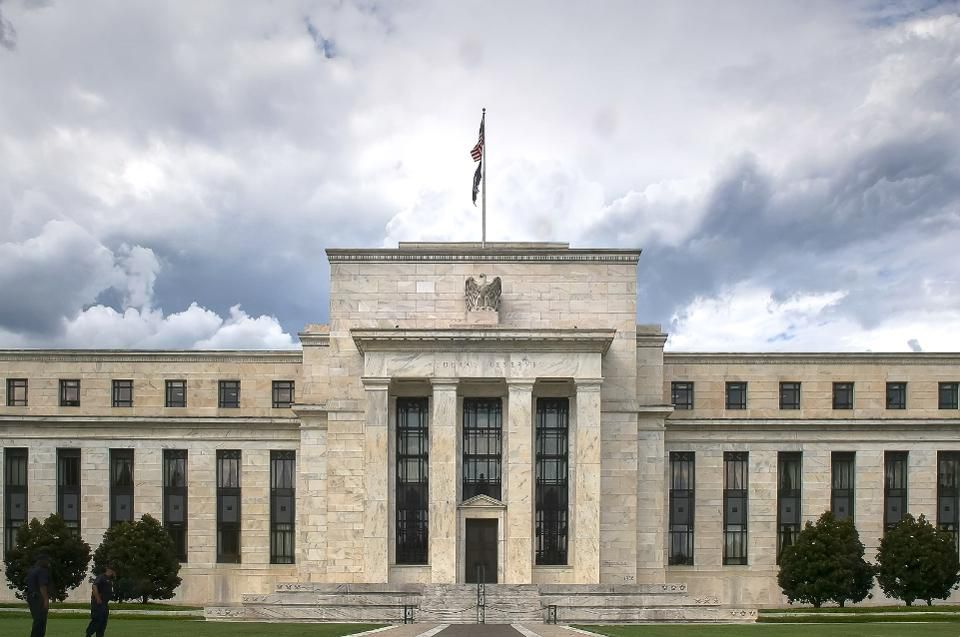
The Hiss Case won’t go away. In 1948, when Whittaker Chambers made his explosive revelations of the web of pro-Soviet espionage by Communist agents in the American government, he unleashed an ongoing self-definitional catfight. By this I mean that the issues raised and the sides taken became litmus tests of one’s political and cultural identity. The Hiss Case wasn’t just another topical controversy, replaced and forgotten in the ever-turning news cycle. One’s response to the charges made by Chambers defined who you were in terms of worldview, attitude, and social status, and has continued to do so after seventy years.
"Like an undead vampire, the ghost of Alger Hiss still stalks our political nightmares."
The case wasn’t conjured up by “McCarthyism,” as stupid people on the left like to proclaim. Senator McCarthy didn’t make any of his accusations until February of 1950, when the two trials of Alger Hiss were over and done with. Trying to refigure the treason of Alger Hiss as merely some sort of witch hunt conducted by anti-Communist fanatics is a propaganda device, one routinely employed by liberals as a way to deflect attention from the factual matters that came to light as a result of Chambers’s testimony. For the American left, those facts were painful, embarrassing, and shaming, and remain so to this day.
Liberals still get truculent and prickly when the Hiss Case is mentioned. Why this is so is a key to understanding politics and class in America. It’s a matter worth exploring.
First off, there was Alger Hiss himself, the Wunderkind of the American professional class. A Johns Hopkins and Harvard-educated superachiever, a law clerk to Oliver Wendell Holmes, a protégé of Felix Frankfurter, a highly placed diplomatic advisor to Roosevelt at Yalta, an architect of the United Nations, as well as glamorous head of the Carnegie Endowment for International Peace, Alger Hiss was the paragon of smug left-liberal superiority and self- assurance. And this same paragon was shown by Whittaker Chambers to be a conscious and willing agent of Stalinism.
The evidence was brutally clear: Hiss had been passing top-secret information to Soviet military intelligence since 1935. (By the way, Hiss’s wife Priscilla and his brother Donald were also deeply implicated in his crimes, showing that the treason was a family affair and not the individual aberration of one man.) Today, after nearly seven decades of research, testimony, and further revelations, the evidence is so heavy that only a leap of religious faith allows any thinking person to deny that Hiss was a traitor and a Communist agent. His treasonous activity took place just prior to and throughout the Second World War, a time of momentous danger and consequence for the West.
The ensuing catfight, as I say, was self-definitional. For left-liberals to acknowledge the treason of Hiss would have been emotionally wrenching. It would have meant admitting that a heroic idol of all they cherished, admired, and supported was in fact a duplicitous criminal. Such pain was too horrible to contemplate, so it was psychologically easier (and more satisfying) to defend Hiss ferociously in the teeth of all evidence, and to demonize his accusers. Right up until the publication of Allen Weinstein’s devastating book Perjury in 1978, Hiss had fanatical defenders everywhere, and even now there are a few lonely lunatics who, like Japanese soldiers chained to their machine guns, will defend the chimera of Hiss’s innocence right down to the last cartridge. “He’s one of the best, and he’s one of us,” was the unspoken viewpoint of every self- congratulatory progressive in the American establishment of 1948. Even otherwise intelligent men like Dean Acheson, John Foster Dulles, and Harry Truman reflexively defended Hiss.
But there was more to it than the amour propre and narcissism of upper-crust leftists. There was also terror that if the charges against Hiss were substantiated, there would be a massive anti- liberal reaction in the United States, which would overturn New Deal programs, discredit the fledgling United Nations, and stop the onward march of “progressivism.” Such an eventuality was unthinkable for the left, and this was a major pragmatic motive behind the fierce defense of the man. Hiss was more than just Hiss—he was the face of sophisticated, upper-class, left-liberal certitude. If he were to be disgraced, so might all the cherished dreams of social revolution. The actual facts didn’t matter in the larger picture of what was politically desirable. This helps explain what Christina Shelton calls “the blind spot” that so many prominent liberals had about Hiss—the more damning the evidence against him, the more doggedly partisan in his favor they became. Weinstein’s book and the declassified Venona intercepts finally demolished the last ramparts of their defensiveness, but the Hiss Case still remains an unhealed wound that can stir up the latent crankiness of leftish types like Kai Bird, and the bottom-feeders at Mother Jones and The Nation.
Unfortunately for their crankiness, however, the testimony of Chambers concerning Hiss and Soviet espionage was independently corroborated by many other persons, and from many other sources. Some were confessed spies themselves, like Nathaniel Weyl and Hede Massing. Others were American ex-Communists like Louis Budenz and Elizabeth Bentley. Others were KGB defectors like Alexander Barmine and Oleg Gordievsky. Even as early as 1939, the French Premier Eduard Daladier warned our ambassador to France, William C. Bullitt, that both Alger and Donald Hiss were Soviet agents, and Bullitt confirmed this to the FBI in 1949, and again to the Senate Internal Security Subcommittee in 1952. No one on the pro-Hiss side of the argument wants to deal with any of this testimony and evidence, preferring instead to repeat the mantras of “Red-baiting” and “McCarthyism.” But then again, this is no surprise: left-liberals have always preferred glandular response to rational thought.
Lately, a last-ditch stand in defense of Hiss (and the Rosenbergs as well) bases itself on the fatuous notion that maybe left-leaning Americans did do some spying for the Soviet Union, but it should be forgotten or excused because they didn’t pass on any really significant information, or anything that wouldn’t have eventually been found out by Moscow from other sources. Besides, goes the plea, the Soviet Union was our ally during the war, and we always share stuff with allies, right? This imbecile defense is the nadir of pro-Hiss propaganda, and even the people who put the argument forward seem a bit sheepish about it. It works better in the U.K., where the left is more robust and unapologetic, and where cretins like Graham Greene could defend Kim Philby and the Cambridge spy group (privileged Oxbridge types who were perfect parallels to Hiss) as having done nothing really wrong.
But let’s return to why the fight was self-definitional. It involves what it means to be on the left in American politics. This is a question that must be considered in a bizarre Alice-Through-the- Looking-Glass fashion, where words are often misleading, and rhetoric has to be read as code.
Leftism in America isn’t really a political commitment, though of course the left takes and supports a recognizable range of political positions. Leftism is, first and foremost, a fashion accessory that indicates a certain type of social status, similar to a Gucci handbag or a Rolex watch. It is a way to define oneself, and proclaim one’s solidarity with a self-conscious elite, and one’s social superiority to a hated group of outsiders. In America, the higher one rises in position, wealth, power, and status, the more leftward one’s political commitments move. This is counterintuitive at first glance, but it is nevertheless true. All their rhetorical arm-pumping about equality, revolution, income-redistribution, and hatred of Wall Street notwithstanding, left- liberals are primarily the representatives of the ruling class in America. They are not an absolutely dominant ruling class, but that is not for want of trying. They very strongly believe that they have the right and duty to govern all the rest of us.
This left-liberal ruling class is especially powerful in academia, the legal profession, journalism, the artistic and chattering classes, entertainment, mainstream TV and electronic media, the big foundations and the non-governmental organizations, and of course our bloated governmental bureaucracies and unionized civil service. As a class, they are particularly concerned with prestige and social standing. Going to the “best” schools, living in trendy neighborhoods, winning awards, being recognized and respected, enjoying the fruits of affluence and the homage of deference—all these perks are lusted after by the Blue State elites. It is a “worldly” mindset, to use the older religious terminology, but the impulse behind it is not strictly one of ambition or greed. The chief motivation is loathing and hatred of the conservative white working class. Yes, you heard right. The left in the United States despises the conservative white working class, and this attitude is now a telltale cultural marker for the sociopolitical divide in America.
As soon as you bring this up, the typical liberal’s response is something like, “My parents were white working-class!” or “My family came from a tough neighborhood!” When I get a response of this nature I answer, “Sure—but would you be caught dead now doing your father’s work, or being a housewife like your mother? Would you even dream of living now in your old neighborhood, or espousing the social attitudes of your parents?” The liberal will then mumble something incoherent about moving beyond all that, or gaining new perspectives, or some other weasel-like evasion.
In brief, the American left likes to claim solidarity with the aspirations of those in lower social strata, but only if those persons are black, brown, illegal immigrants, homosexuals, non- Christians, non-Europeans, or criminals. White working-class conservatives receive absolutely no sympathy from the left, and in fact are treated as a pariah class worthy of contempt and ridicule.
This is the key to understanding why Alger Hiss and his treason still matter, and why the rage of left-liberals is still lava-hot over the man’s downfall, conviction, and imprisonment. In the Hiss Case, the white conservative working class won. During the 1948 House Un-American Activities Committee hearings, it was the elected representatives of the white working class, Democrats and Republicans alike, who slowly forced the truth out of Alger Hiss. Persistent congressmen like John Rankin of Mississippi, Richard Nixon of California, Felix Hébert of Louisiana, and Karl Mundt of South Dakota kept questioning Hiss until his credibility was in tatters. These representatives unmasked Hiss and a passel of his chic left-wing associates, making possible the indictments that broke the back of Communist subversion in the United States. These representatives demonstrated that there was massive Communist infiltration of the American government under FDR, and that ruinous diplomatic decisions were made in the wake of that treasonous infiltration. It is this victory that left-liberals can never forgive, because it hit them—publicly—in their self-definition, and their pride of place. They never expected it, and they were blindsided by it.
There is a phenomenon of the Hiss Case that serves as a useful illustration of my point. Many of the persons who defended Hiss often said something along the following lines: “Alger Hiss can’t possibly be guilty! He’s a Harvard graduate, he clerked for a Supreme Court justice, he’s a prominent State Department figure, and he’s the head of a major foundation! Look at all the important and famous people who are his associates!”
Conservatives were always baffled by this strange defense, since it seemed to hinge on the weird assumption that prominent personages can’t be criminals. But I think that if we examine the argument from the left’s viewpoint, we’ll see that it was being advanced quite sincerely and without guile. The defense is perfectly understandable if we read it as a claim to aristocratic privilege: Hiss is a member of the governing elite; by definition he can do no wrong! This is the same claim made by any mandarin class, whether the Prussian Junkers in Wilhelmine Germany, the landed gentry in Victorian England, the nomenklatura in the Soviet Union, or the upper-level managerial class in American corporate life today. People in such aristocracies sincerely feel that they have an inherent right to rule, and cannot be brought to book; they are a protected class immune from prosecution. The American left has always believed this about itself; the imprisonment of Hiss was a hard slap in the face that contradicted it. They weren’t even especially bothered over the fact that their espionage for the Soviet Union was scotched. But they were infuriated that their social inferiors had humiliated them “in the court of public opinion,” as Hiss himself stiltedly phrased it.
And that is why the treason of Alger Hiss still matters. The continuing fury of the mandarin-class left over the controversy is symptomatic of what we have to face in new but virulent form today: the arrogance, the presumption, the de haut en bas smugness, and the sheer hatred that left- liberalism has for the white working class. That class is now the only obstacle to a more or less hegemonic governance of Western society by left-liberalism. For this reason, that white working class is the target for marginalization, oppression, silencing, and eventual political oblivion. The Communists whom Alger Hiss served called such a policy “social prophylaxis” when directed against kulaks or the bourgeoisie, and it could involve anything from ostracism and discrimination to exile and imprisonment to starvation and mass murder. Left-liberals today call it “raising consciousness” or “social transformation” or “affirmative action” or any number of other euphemistic phrases. But the goal is identical: the elimination of a hated and distrusted group. Like an undead vampire, the ghost of Alger Hiss still stalks our political nightmares.

